Happy Monday! Retired international baseball star Ichiro Suzuki was one of four players to be inducted into the Baseball Hall of Fame on Sunday, and, while thanking the Miami Marlins for signing him in the late stages of his career, decided to come clean: “Honestly, when you guys called to offer me a contract for 2015,” he said, “I had never heard of your team.”
Then again, this is the same player who received a text message from Tom Brady, requesting to meet Ichiro and study his stretching routine, and asked his coaches: “Who the f— is Tom Brady?”
Quick Hits: Today’s Top Stories
- President Donald Trump announced Sunday that the U.S. had reached a trade agreement with the EU. According to Trump, the deal would impose a 15 percent tax on most EU goods, including automobiles, while EU countries would eliminate all duties on American products. The president added that the bloc had agreed to purchase $750 billion in American energy, as well as invest an additional $600 billion in the United States. Speaking alongside European Commission President Ursula von der Leyen in Scotland, Trump claimed that the deal constituted “the biggest deal ever made.” Von der Leyen, for her part, said the arrangement would bring “stability” and “predicability” to the transatlantic trade relationship.
- The Israeli military on Sunday announced plans to implement daily “tactical pauses” in fighting across the Gaza Strip to allow for the delivery of additional food and other supplies. Under the plan, there will be designated “secure routes” along which United Nations aid trucks can travel to reach densely populated areas of the enclave. An Egyptian aid convoy of more than 100 trucks entered the Strip on Sunday, delivering more than 1,200 tons of food aid via Gaza’s Kerem Shalom border crossing with Israel. Speaking from Ramon Air Force Base on Sunday, Israeli Prime Minister Benjamin Netanyahu pushed back on claims by the U.N. that Jerusalem had previously hindered the entry of aid into the Strip: “It is allowed. There are secured convoys. There have been all along, but today it is official.” Tom Fletcher, the U.N.’s Under-Secretary-General for Humanitarian Affairs, told the BBC over the weekend that Israel’s move was a “start,” but that it represented just a “drop in the ocean” of what civilians in Gaza need.
- Thailand and Cambodia agreed to a ceasefire early Monday morning, according to Malaysian Prime Minister Anwar Ibrahim, after long-simmering tensions between the two neighboring countries erupted into cross-border fire in recent days. The fighting, which had killed an estimated 35 people and displaced more than 218,000, began Thursday as both countries blamed the other for the hostilities. Malaysia convened the negotiations between Thai and Cambodian leaders, according to the Wall Street Journal.
- The Rapid Support Forces (RSF) paramilitary group and its mostly Arab allied militias, the coalition battling the Sudanese Armed Forces in a civil war that has killed tens of thousands since its start in April 2023, on Saturday announced the formation of a rival parallel government in Sudan. A 15-member presidential council will be led by RSF military leader Gen. Mohamed Hamdan “Hemedti” Dagalo, whom the U.S. government sanctioned in January for human rights abuses perpetrated by his forces, including sexual violence and extrajudicial executions. Meanwhile, a Sudanese politician, Mohammed Hassan al-Taishi, was named prime minister of the new government. In a statement on Sunday, the Sudanese Ministry of Foreign Affairs condemned the formation of the RSF-led rival governing body, urging nations and organizations against recognizing what it called an “illegitimate entity declared by the terrorist militia.”
- An armed group of rebels aligned with the Islamic State attacked a Catholic church in the Democratic Republic of Congo’s city of Komanda early Sunday morning, reportedly killing at least 43 people and setting fire to nearby homes and shops. Rebels armed with guns and machetes also took children, mostly between 12 and 14 years old, hostage. The church’s sole priest, Father Aimé Lokana Dhego, said that Congolese and U.N. forces did not arrive until after the rebels ended the massacre and left with hostages.
- U.S. forces conducted a raid in Aleppo, Syria, on Friday morning, targeting and killing a senior ISIS leader, Dhiya’ Zawba Muslih al-Hardani, U.S. Central Command announced in a statement. Two of al-Hardani’s adult sons, also affiliated with the Islamic State, were killed in the operation, the press release stated, adding that the trio posed a threat to both U.S. forces and the new Syrian government. Three women and three children present on-site during the raid were unharmed. “ISIS terrorists are not safe where they sleep, where they operate, and where they hide,” CENTCOM commander Gen. Michael “Erik” Kurilla said.
- The European Union announced Friday that one-third of a foreign aid fund for Ukraine, or $1.7 billion, will be withheld due to the war-torn country’s failure to meet three of the EU’s good governance benchmarks. The decision—which is not final and can be reversed—followed protests in Kyiv last week over Ukraine’s recent passage of a bill increasing the president’s power over two anti-corruption watchdogs. Ukrainian President Volodymyr Zelensky began changing course on Thursday, however, introducing a bill to Ukraine’s parliament that would restore independence to Ukraine’s National Anticorruption Bureau and Specialized Anticorruption Prosecutor’s Office. Meanwhile, on Saturday, Russia launched 235 drones and 27 missiles in an overnight air raid on the central western Ukrainian city of Dnipro and the surrounding area, killing three people. Ukraine on Sunday countered with a drone attack on St. Petersburg, prompting Russian President Vladimir Putin to scale back a naval parade held in the city.
‘Liberation Day’ Limbo
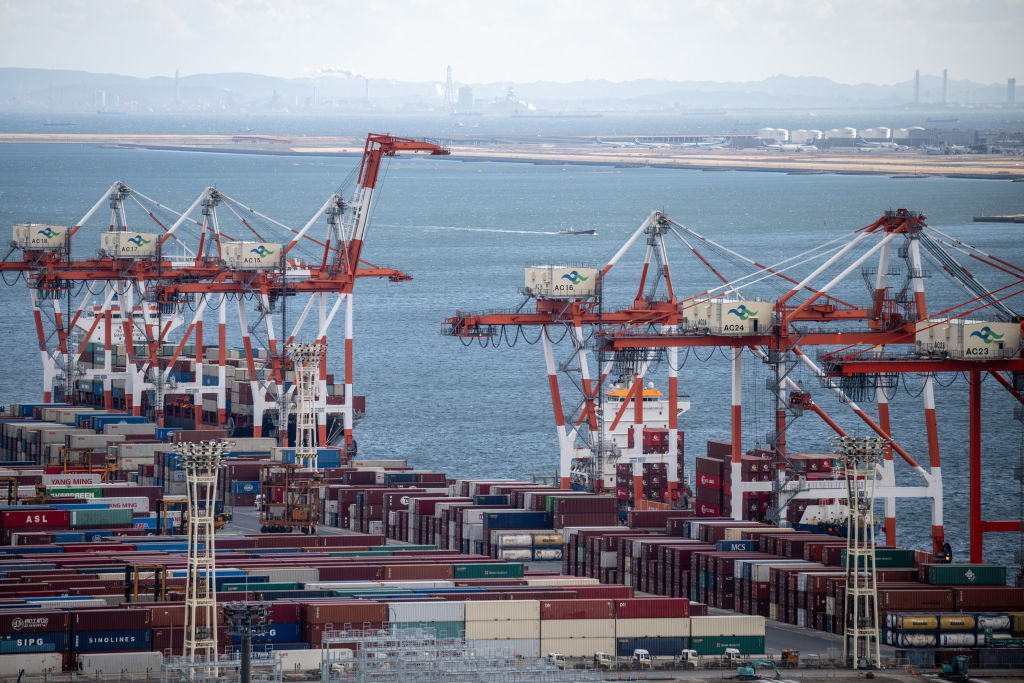
It’s “TACO” time no more, the White House insists. On Sunday, Commerce Secretary Howard Lutnick said on “Fox News Sunday” that the Trump administration’s previously announced tariffs will take effect on Friday, August 1. No more delays, no extensions. The deadline has left many countries scrambling for an 11th-hour deal.
But at least one trading partner can breathe a sigh of relief: On Sunday, President Donald Trump announced a trade agreement with the European Union, averting a protracted trade war with what he described as “the biggest deal ever made.” According to Trump, the U.S. will impose a blanket 15 percent tax on most EU goods, and, in exchange, the bloc will eliminate all duties on American products. He also claimed that the EU would buy $750 billion in American energy products and invest an additional $600 billion in the U.S.
“The starting point was an imbalance,” European Commission President Ursula von der Leyen said after meeting with Trump in Scotland. “We wanted to rebalance the trade we made, and we wanted to do it in a way that trade goes on between the two of us across the Atlantic, because the two biggest economies should have a good trade flow.”
The news of the deal followed a flurry of agreements with other nations in recent days, but the agreements don’t necessarily mean we’re out of the tariff woods yet, as many trade barriers across the world are soon poised to return to “Liberation Day” levels once again. Even if more countries reach agreements with the Trump administration before its self-imposed August 1 negotiation deadline, the still-elevated import taxes that result could still rattle the U.S. economy, as many countries accepting the White House’s terms are left with tariff rates far higher than they were before Trump took office. Plus, significant details in each major agreement are still up in the air.
Before the EU deal, one of the biggest agreements struck in recent days was with Japan. Trump announced the deal on Tuesday, but the exact terms are still murky. According to a Truth Social post by Trump, the agreement set the U.S. tariff rate on Japanese imports at 15 percent—a welcome reduction from 25 percent Trump had previously threatened, but higher than the 10 percent levy that was in place while the countries negotiated. The Trump administration’s 25 percent global auto tariff will also drop to 15 percent for Japanese cars as part of the deal, and there will be no quota on the total number of imports. Trump also said that Japan would reduce barriers to the import of American cars and rice, and the U.S. ally would invest $550 billion into an investment fund to be used, supposedly, at Trump’s discretion. The president claimed the U.S. would “receive 90 percent of the profits,” describing the investment as “seed money.”
However—in what may be a troubling sign for all the White House’s trade agreements—the deal is more wobbly than Trump made it sound. There is no written deal between the two countries, and Japan has already contradicted some of Trump’s claims. According to Japan, the U.S. would receive profits from the investment fund proportional to its contributions and assumption of risk—a stark difference from Trump’s claim that Japan was fully financing a fund that gave the lion’s share of the profits to Washington. Moreover, the deal was reportedly a product of a hasty, 70-minute meeting between Trump and Japan’s chief negotiator. “The Japanese are describing [the fund] in vastly different terms than the president,” Justin Wolfers, a professor of public policy and economics at the University of Michigan, told TMD.
The discrepancy makes it difficult to tell what, exactly, the agreement actually entails. “There’s just no information whatsoever,” Mark Zandi, chief economist of Moody’s Analytics, told TMD. “I doubt, at the end of the day, it’s going to result in any increased investment in the United States.”
Looking beyond issues with the investment fund, the deal itself may also be less favorable for Americans than it initially seemed. The Japan agreement is unlikely to cause a significant change in demand for American cars or revenue to American rice farmers, according to Wolfers. And, of course, it results in tariffs that, while lower than what Trump initially threatened, are still significantly higher than tariff rates in recent history.
“Nearly everyone was charging us tariffs of about 2 percent. We were charging them tariffs of about 2 percent,” Wolfers said. “Whatever tariff we end up charging Americans who import goods from Japan, it’s enormously higher than it was. If I look at the Japan agreement, what is economically meaningful is the tax on Americans who buy from Japan has gone from 2 percent to 15 percent.”
Similar deals have been struck with other countries, as well, but the results are a mixed bag. The United Kingdom reached a trade deal in May that kept levies at 10 percent, Vietnam received a rate of 20 percent, and the Philippines and Indonesia both landed at rates of 19 percent. The tariffs were not dramatically different from the April “Liberation Day” numbers—Indonesia and Vietnam dropped the most, from 32 percent and 46 percent, respectively. But the Philippines’ tariff at the time was 17 percent, and the U.K. rate was 10 percent, making the new deal a downgrade for the Philippines and a lateral move for Britain.
And with details not set in stone, the U.K. has also already faced issues with its agreement, particularly around restrictions on steel. Prime Minister Keir Starmer is set to meet with Trump on Monday to discuss the issue, as well as to seek a carveout from possible future pharmaceutical tariffs. The EU isn’t particularly satisfied with its deal, either. The bloc’s leaders were reportedly hoping for a rate that was 5 percentage points lower. “15 percent is not to be underestimated,” von der Leyen told reporters yesterday. “But it is the best we could get.”
China, on the other hand, faces a separate deadline of August 12 to reach an agreement with the U.S., although the date is expected to be extended another 90 days. Mexico and Canada are also wild cards, as the two major trading partners haven’t yet reached a deal with the U.S. If negotiations fail to produce an agreement by the end of the month, products from Canada could be slapped with 35 percent tariffs, and goods from Mexico 30 percent. In a foreboding sign, Trump cast doubt on whether a deal could be reached with Canada at all when talking to reporters on Friday. “We haven’t really had a lot of luck with Canada,” he said. “I think Canada could be one where there’s just a tariff, not really a negotiation.”
“We’re back to where we were on Liberation Day,” Zandi said. “The tariffs have been up, down, all around, but when you look at the actual effective tariff rate—the rate that is being paid by U.S. consumers and businesspeople—it’s close to what the president put forward on Liberation Day.” The overall U.S. average effective tariff rate started at 2.4 percent in January, rose to its peak of 28 percent in April, and currently stands at 16.6 percent before the August 1 deadline. After the deadline, the rate will jump to 20.2 percent.
“We’ll see slower growth and higher inflation over the course of the next six to 12 months. A good rule of thumb is that for every 1 percentage point increase in the effective tariff rate, that’ll raise inflation … 10 basis points,” Zandi said. Using this method, a nearly 18-point increase in the effective tariff rate from January would increase inflation by roughly 1.8 percent. “It’s going to be a pretty uncomfortable economy, and it’s going to be very vulnerable to anything else that goes wrong,” Zandi said. “The most likely scenario is we navigate through without a downturn, but it’s not going to feel very good. But all the risks are to the downside.”
The Wall Street Journal reported last week that corporations have largely absorbed the costs of Trump’s tariffs thus far, accepting lower profit margins before raising prices for consumers. But that phenomenon may be coming to an end. “I think ultimately, it won’t continue,” Morris Cohen, a professor of manufacturing and logistics at the Wharton School at the University of Pennsylvania, told TMD. “I think there will be prices that will go up across the board. … That’s part of the reason we’re in a holding pattern for some companies because they don’t want to be caught being the first one, or maybe the only one to raise the price and be left at a disadvantage.”
No matter what, though, companies—and global trading partners—are going to have to wrestle with the fact that the high tariffs are, in fact, going to take effect. “Cutting through the noise, tariffs are up, and they’re up a lot, and they’re going to go higher,” Zandi said. “There’s no TACO here. It’s actually happening.”
Today’s Must-Read

Do You Have a ‘High-Quality’ Family?
Toeing the Company Line
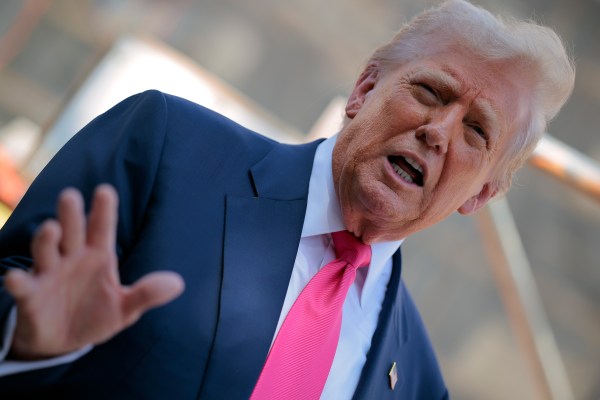

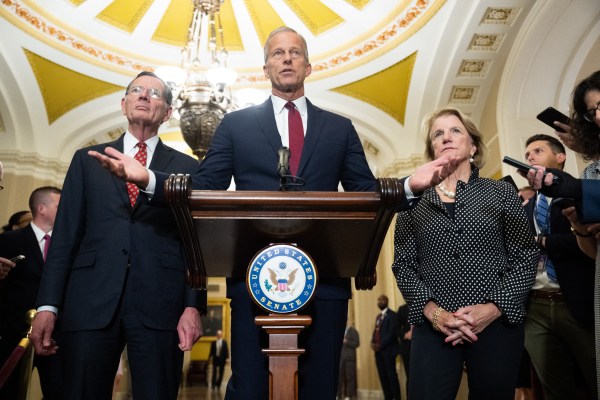
Will the Senate Squeeze the House in September?
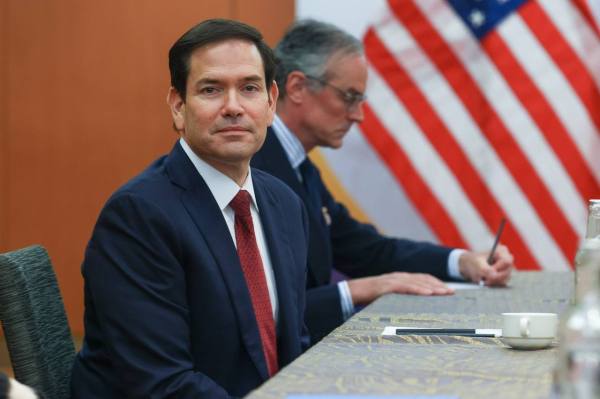
State Department Muzzles U.S. Diplomats on Foreign Elections
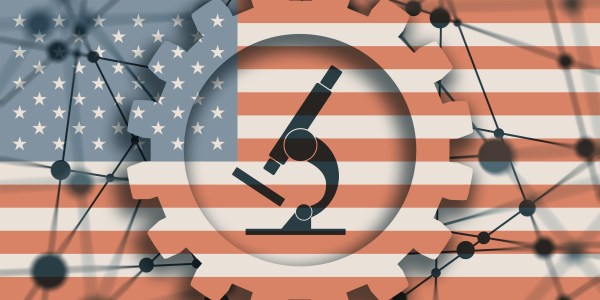
‘Gold Standard Science’ in Theory and Practice

Till Words Do Us Part

The American Princess Problem

Nature Is Trying to Kill You | Solo

Worth Your Time
- Some summer camps in Kerr County, Texas—the site of devastating flooding earlier this month—have begun to reopen their doors, Carlos Nogueras Ramos reported in a piece for the Texas Tribune. “[Camp CAMP], which can accommodate up to 120 campers overnight at a time, serves people with mild to severe disabilities and runs one-week sessions tailored to varying levels of disability. Every camper is on a buddy system, meaning they’re accompanied by a volunteer at all times,” he wrote. “Cord Shiflet, a real estate magnate in Austin, put out a call for help to his 66,000 Facebook followers and arrived in Kerr County the day after the flood with around 250 volunteers, construction crews and equipment—by the fourth day the number of volunteers had grown to more than 1,100 volunteers. When Camp CAMP requested the group’s help, Shiflet wrote on Facebook: ‘THIS is what we’ve been looking for—a truly amazing opportunity to help and make a very meaningful difference with a huge and immediate positive impact. We need to throw everything we’ve got at this.’ Four days before the camp was set to open, the area was swarming with volunteers driving in and out of the riverside area. Piles of debris towered over the volunteers, and they used a dump truck, excavators and other equipment to remove it.”
- Space battles, typically reserved for science fiction narratives, could be a reality in the not-too-distant future. “Towards the end of last year a pair of military satellites, one American and the other French, prepared for a delicate orbital minuet,” The Economist wrote in a report about U.S. Space Command’s efforts to stay ahead of the curve on military-space technology. “They were about to conduct a so-called rendezvous and proximity operation (RPO)—in which one or more satellites approach another to inspect or manipulate it—near an enemy satellite. They have not said which, but it is not hard to guess. ‘The French have talked about Russian manoeuvres [near French satellites] over the years,’ says General Stephen Whiting, speaking at the headquarters of US Space Command in Colorado Springs.” The test run exceeded expectations: “The exercise was so successful, [Whiting] says, that there are plans to repeat it later this year. … It also embodies America’s new, more muscular approach to space. Space Command was re-established in 2019 during Donald Trump’s first term. In recent years it has focused on building its headquarters and developing staff. Now it is ready. ‘We now have a combatant command focused on war fighting’ in space, says General Whiting.”
Presented Without Comment
Rolling Stone: Astronomer Enlists Gwyneth Paltrow as ‘Temporary Spokesperson’ Amid Coldplay Viral Scandal
Also Presented Without Comment
Axios: Ethics Panel Orders AOC to Pay Additional $3,000 for 2021 Met Gala
A House Ethics Committee report released Friday found that Rep. Alexandria Ocasio-Cortez (D-N.Y.) underpaid for costs related to her attendance at the 2021 Met Gala and instructed her to make additional payments. … The committee said it will consider the matter closed once the payments are made, marking the end of a years-long saga triggered by Ocasio-Cortez’s headline-making “Tax the Rich” gown.
Also Also Presented Without Comment
Washington Post: Venezuelan Little League Team Denied Travel Visas To U.S. For [Senior League Baseball] World Series
In the Zeitgeist
On Friday, Nick Kurtz, the Athletics’ 22-year-old rookie first baseman, became the 20th player in the history of professional baseball—and the first rookie—to hit four home runs in a single game.
In 2024, Kurtz—nicknamed the “Big Amish”—was still swinging an aluminum bat while playing for his college team at Wake Forest. Now, just over a year later, the wooden bat he used in the historic game is heading to the Baseball Hall of Fame. While he considered continuing to use the lucky bat, Kurtz said, “When the Hall of Fame asks, you have to kind of just do it.”
Let Us Know
Do you expect Trump to hold to his tariff threats?

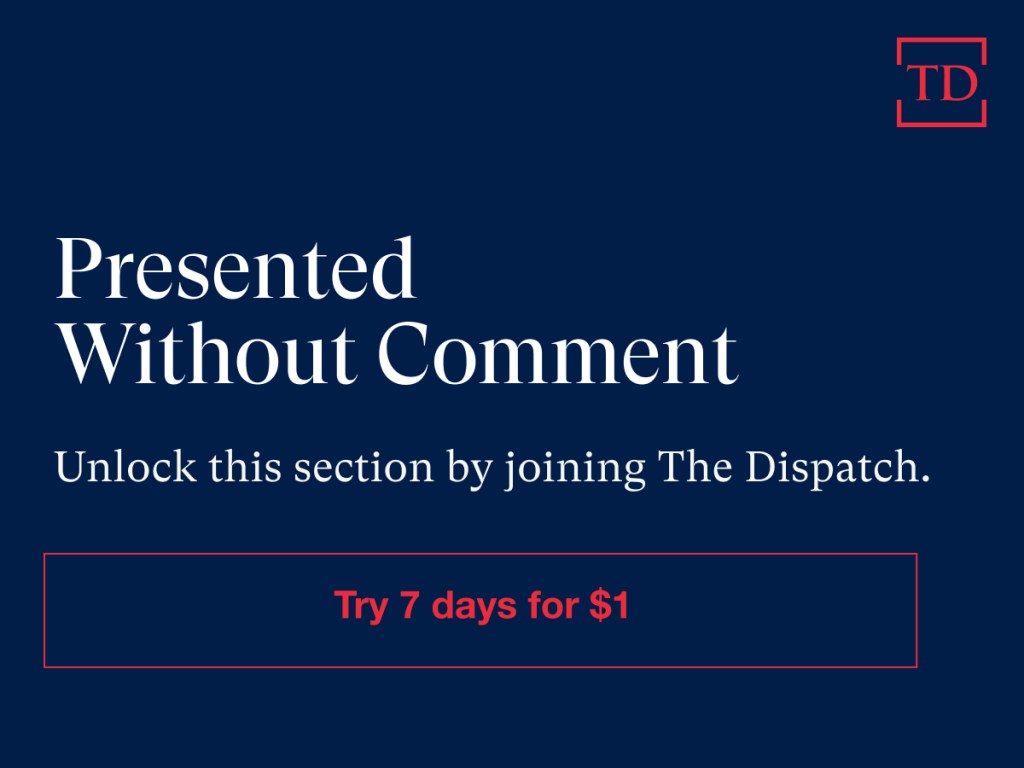




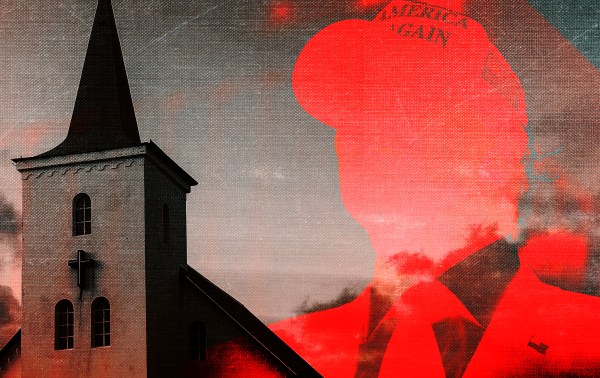


Please note that we at The Dispatch hold ourselves, our work, and our commenters to a higher standard than other places on the internet. We welcome comments that foster genuine debate or discussion—including comments critical of us or our work—but responses that include ad hominem attacks on fellow Dispatch members or are intended to stoke fear and anger may be moderated.
With your membership, you only have the ability to comment on The Morning Dispatch articles. Consider upgrading to join the conversation everywhere.